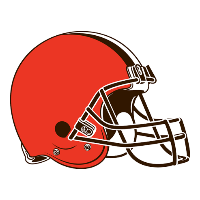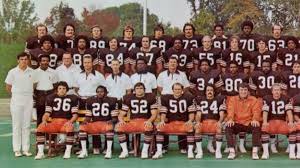
Cleveland Browns

1944 Cleveland, OH
The history of the Cleveland Browns is one of the richest and most complex in the NFL, characterized by early triumphs, a series of challenges and the unwavering support of their fans. From their founding in 1944 to the present, the Browns have left an indelible mark on professional soccer.
The founding and early dominance of the Cleveland Browns in the world of professional soccer is a testament to exceptional strategy, unparalleled talent and a culture of innovation that defined an era. Under the leadership of Arthur B. McBride, a forward-thinking entrepreneur, and the technical and managerial direction of Paul Brown, a living legend of the sport, the Browns quickly became a force to be reckoned with in both the AAFC and later the NFL.
McBride's Vision and Paul Brown's Genius
Arthur B. McBride, upon acquiring the franchise for Cleveland in the nascent All-America Football Conference, made his shrewdest move by recruiting Paul Brown as coach and general manager. Brown, already recognized for his accomplishments in college and high school soccer, brought with him not only a name that would become synonymous with success in American soccer but also a playing philosophy that would be light years ahead of its time.
AAFC Dominance
From their debut in 1946, the Cleveland Browns not only dominated the AAFC, they redefined what success in professional soccer meant. With an impressive winning record and a streak of four consecutive AAFC championships, the Browns not only racked up trophies, but also earned the respect and admiration of fans and opponents alike. The foundation of this success was a team that included Otto Graham, Marion Motley and Lou Groza, whose on-field exploits left an indelible mark on the sport.
Transition to the NFL and Continued Success
The jump to the NFL in 1950 was seen by many as the true test for the Browns and their legacy of dominance. However, any doubts about their quality were quickly dispelled with a convincing victory over the defending champions, the Philadelphia Eagles, in their first NFL game. This victory was not a fluke, but the beginning of a decade of excellence that saw the Browns reach the NFL championship game nearly every year, securing titles in 1950, 1954 and 1955, and cementing their status as a dynasty in the sport.
Legacy of Innovation and Excellence
The Browns' era of early dominance was not only characterized by victories on the field, but also by innovation off the field. Paul Brown pioneered many of the strategies, tactics and coaching practices that are now taken for granted in professional soccer. From the implementation of the playbook to the introduction of game filming for post-game analysis, Brown and the Browns left a mark on the sport that goes beyond his on-field accomplishments.
The Cleveland Browns of the 1940s and 1950s were not just a team that won championships; they were an institution that defined and elevated the standard of professional soccer. Their impact on the sport remains palpable, serving as an enduring reminder of what is possible when vision, talent and innovation come together in the pursuit of excellence.
The 1995 Cleveland Browns relocation controversy and subsequent challenges faced by the franchise represent one of the most tumultuous chapters in NFL history, setting a precedent for the relationship between teams, their fans and host cities. This period not only tested the loyalty of the Browns' fan base, but also triggered a re-evaluation of how professional leagues approach franchise relocations.
The Relocation Controversy
Art Modell's decision to move the Browns to Baltimore was met with a mixture of disbelief, anger and deep sadness from the Cleveland community and fans at large. The Browns franchise, with a rich history of success and a passionate fan base, was considered a mainstay in the NFL. Relocation not only threatened to erase decades of tradition and history, but also raised questions about loyalty in professional sports and the impact of such decisions on the affected cities and communities.
The Community Response and the Single Agreement
The vehement reaction from fans and the city of Cleveland against the move was remarkable. Through protests, lawsuits and a grassroots campaign, they were able to exert enough pressure to reach an unprecedented agreement with the NFL. This agreement allowed the Browns' identity-including their name, colors and history-to remain in Cleveland, awaiting the return of the franchise, which would be finalized with the formation of a new team in 1999. This move not only ensured the Browns' continuity in Cleveland, but also set a new standard for how fans can influence critical decisions by sports franchises.
Challenges in the Modern Era
Since returning to the league in 1999, the Cleveland Browns have faced significant challenges to regain the stability and success of their early years. The struggle to find consistent direction has been evident in the high turnover of head coaches and quarterbacks, reflecting a lack of continuity that has hindered the team's sustained development on the field. Despite these challenges, the franchise has shown flashes of potential, such as during the 2020 season, in which the Browns not only made the playoffs but also won their first postseason game since their return, reviving hope among their loyal fans.
This journey, from the relocation controversy to the efforts to rebuild and stabilize the franchise, illustrates the resilience of both the Browns and their fan base. The story of the Cleveland Browns in this period is not only one of challenge and change, but also a narrative about the importance of community, identity and persistence in professional sports.
Legacy and Cultural Impact
Despite the challenges, the Browns have maintained a passionate and loyal fan base. The relocation controversy not only demonstrated the dedication of these fans, but also sparked a nationwide shift in how cities and teams approach the issue of stadiums and franchise relocation.
The Cleveland Browns are not just a soccer team; they are a testament to the love of the sport, resilience in the face of adversity, and the importance of a community united in support of their team. Their rich history remains a source of pride and a reminder of the ups and downs inherent in professional sports.







































